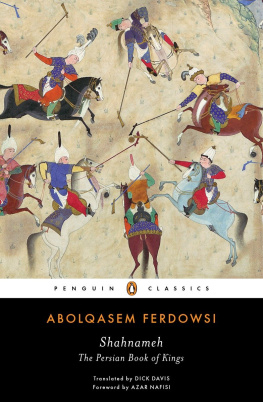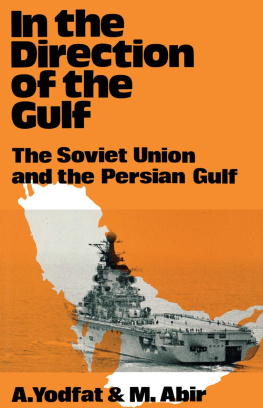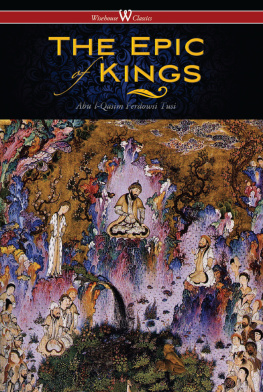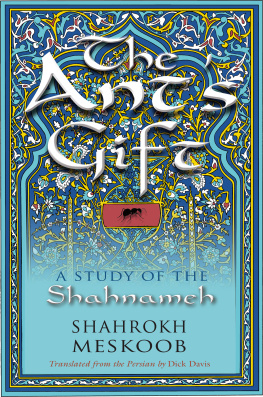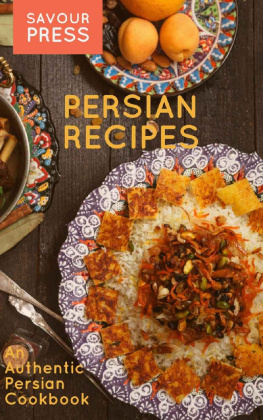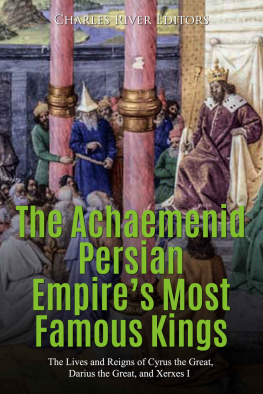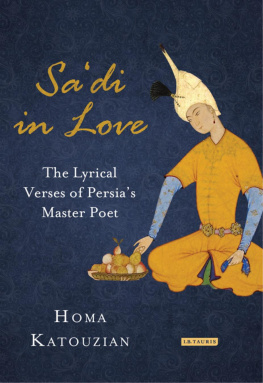Abolqasem Ferdowsi - Shahnameh: The Persian Book of Kings
Here you can read online Abolqasem Ferdowsi - Shahnameh: The Persian Book of Kings full text of the book (entire story) in english for free. Download pdf and epub, get meaning, cover and reviews about this ebook. year: 2016, publisher: Penguin Publishing Group, genre: History. Description of the work, (preface) as well as reviews are available. Best literature library LitArk.com created for fans of good reading and offers a wide selection of genres:
Romance novel
Science fiction
Adventure
Detective
Science
History
Home and family
Prose
Art
Politics
Computer
Non-fiction
Religion
Business
Children
Humor
Choose a favorite category and find really read worthwhile books. Enjoy immersion in the world of imagination, feel the emotions of the characters or learn something new for yourself, make an fascinating discovery.
- Book:Shahnameh: The Persian Book of Kings
- Author:
- Publisher:Penguin Publishing Group
- Genre:
- Year:2016
- Rating:3 / 5
- Favourites:Add to favourites
- Your mark:
- 60
- 1
- 2
- 3
- 4
- 5
Shahnameh: The Persian Book of Kings: summary, description and annotation
We offer to read an annotation, description, summary or preface (depends on what the author of the book "Shahnameh: The Persian Book of Kings" wrote himself). If you haven't found the necessary information about the book — write in the comments, we will try to find it.
Shahnameh: The Persian Book of Kings — read online for free the complete book (whole text) full work
Below is the text of the book, divided by pages. System saving the place of the last page read, allows you to conveniently read the book "Shahnameh: The Persian Book of Kings" online for free, without having to search again every time where you left off. Put a bookmark, and you can go to the page where you finished reading at any time.
Font size:
Interval:
Bookmark:

PENQUIN  CLASSICS
CLASSICS
SHAHNAMEH
ABOLQASEM FERDO WSI was born in Khorasan in a village near Tus, in 940 CE . His great epic the Shahnameh, to which he devoted most of his adult life, was originally composed for the Samanid princes of Khorasan, who were the chief instigators of the revival of Persian cultural traditions after the Arab conquest. During Ferdowsis lifetime, the Samanid dynasty was conquered by the Ghaznavid Turks. Legend has it that Ferdowsis lifework was not appreciated by King Mahmud of Ghazneh. He is said to have died around 1020 in poverty and embittered by royal neglect, though confident of his poems ultimate fame.
A Fellow of the Royal Society of Literature, DICK DAVI S is Emeritus Professor of Persian at Ohio State University. His other translations from Persian include Borrowed Ware: Medieval Persian Epigrams, The Legend of Seyavash, Vis and Ramin, Faces of Love: Hafez and the Poets of Shiraz, and, with Afkham Darbandi, The Conference of the Birds.
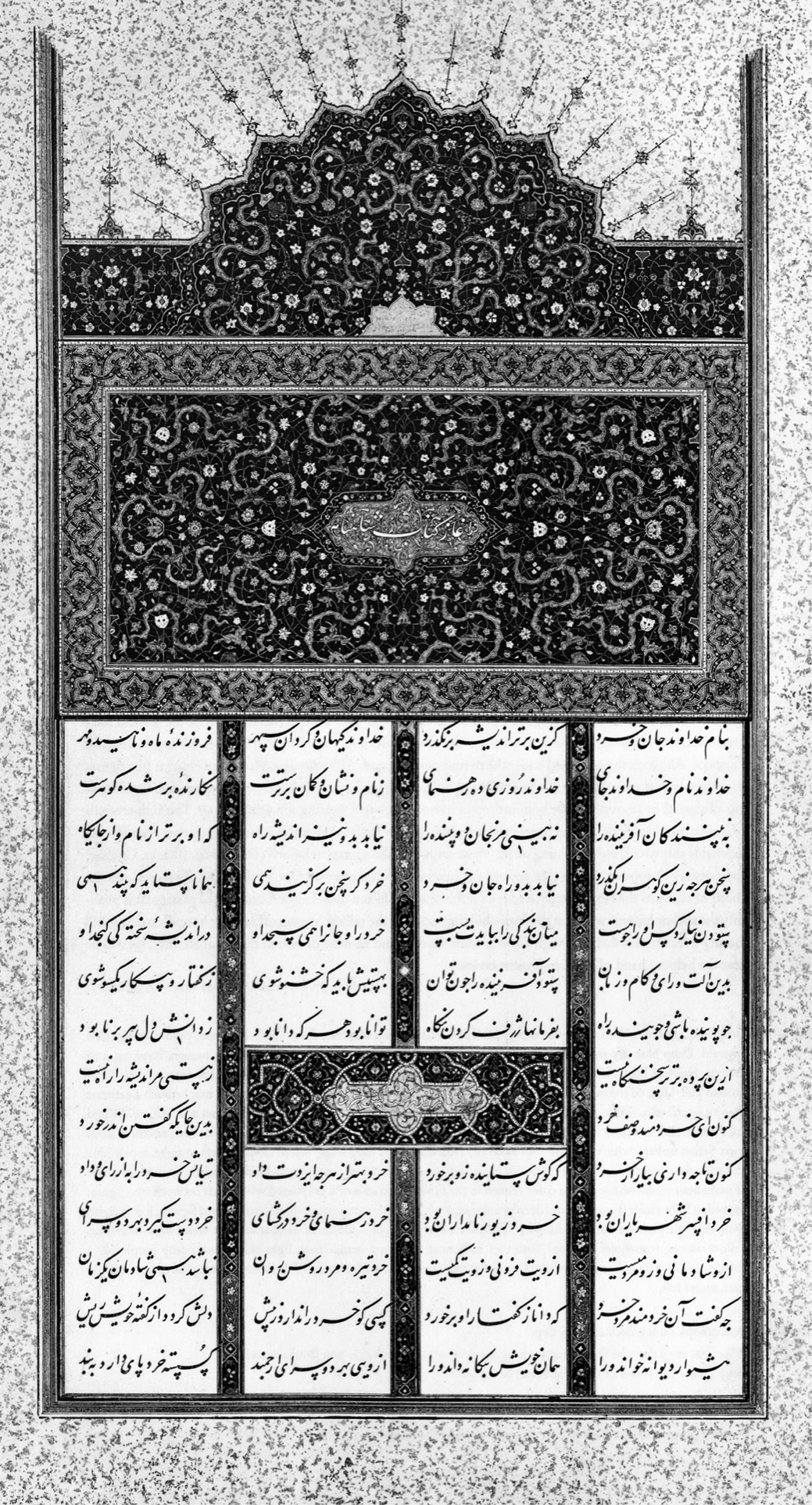

PENGUIN BOOKS
An imprint of Penguin Random House LLC
375 Hudson Street
New York, New York 10014
penguin.com
First published in the United States of America by Viking Penguin,
a member of Penguin Group (USA) Inc., 2006
Published in Penguin Books 2007
This expanded edition published 2016
Copyright 1997, 2000, 2004, 2016 by Mage Publishers
Introduction copyright 2006 by Azar Nafisi
Penguin supports copyright. Copyright fuels creativity, encourages diverse voices, promotes free speech, and creates a vibrant culture. Thank you for buying an authorized edition of this book and for complying with copyright laws by not reproducing, scanning, or distributing any part of it in any form without permission. You are supporting writers and allowing Penguin to continue to publish books for every reader.
Originally published in three volumes entitled The Lion and the Throne, Fathers and Sons,
and Sunset of Empire by Mage Publishers, Washington, D.C.
Illustrations provided by Dr. Ulrich Marzolph from his archive of Persian
lithographed book illustrations in Goettingen, Germany.
eBook ISBN 9781101993231
LIBRARY OF CONGRE SS CATALOGING - IN - PUB LICATION DATA
Names: Firdawsi, author. | Davis, Dick, 1945 translator.
Title: Shahnameh : the Persian book of kings / Abolqasem Ferdowsi ;
translated by Dick Davis ; foreword by Azar Nafisi.
Other titles: Shahnamah. English
Description: New York : Penguin Books, 2016. | Series: Penguin classics
Identifiers: LCCN 2015045006 | ISBN 9780143108320 (paperback)
Subjects: | BISAC: POETRY / Epic. | POETRY / Ancient, Classical & Medieval. |
POETRY / Middle Eastern.
Classification: LCC PK6456.A13 D3813 2016 | DDC 891/.5511dc23
Cover art: (detail) Siyavush Plays Polo before Afrasiyab, Qasim ibn Ali, c.152030. The Metropolitan Museum of Art, gift of Arthur A. Houghton, Jr. / Image source. Art Resource, NY.
Version_1
This translation is dedicated to
Mohammad and Najmieh Batmanglij,
with my gratitude and affection.
BY
A ZAR N AFISI
I have two books in front of me. One is the galley for Dick Daviss Shahnameh, The Persian Book of Kings; the other is a much thinner book, designed for young readers and on its cover, above a Persian miniature painting of men on horses, is written in Persian: Selections from Shahnameh, by Ahmad Nafisi. In his introduction to this selection, my father mentions that the idea for this book goes back to the time he started telling stories from Persias classical literature, beginning with Ferdowsis Shahnameh, to my brother and me when we were no more than three or four years old and later to our children. My father always insisted that Persians basically did not have a home, except in their literature, especially their poetry. This country, our country, he would say, has been attacked and invaded numerous times, and each time, when Persians had lost their sense of their own history, culture and language, they found their poets as the true guardians of their true home. Citing the poet Ferdowsi and how, after the Arab invasion of Persia, he rescued and redefined his nations identity and culture through writing the epic of Persian mythology and history in his Book of Kings, my father would say, We have no other home but this, pointing to the invisible book, this, he would repeat is our home, always, for you and your brother, and your children and your childrens children.
Thus it was that like so many other Persian children my brother and I and later our children grew up with the Shahnameh and in the kingdom of imagination our father had created for us. Rostam, Tahmineh, Seyavash, Bizhan and the other fictional characters in Ferdowsis stories became our brothers and sisters, cousins and neighbors. Ferdowsis devoted readers throughout the centuries rewarded him by creating their own legends around him. When I was a married woman with children of my own, my father, in the same manner he used when I was a small child, would tell my children of the conflict between the noble poet Ferdowsi and the fickle king, Sultan Mahmud Ghaznavi. Dick Davis gives us the factual historical account, but we heard the popular one, the one that like the stories in the Shahnameh, while more akin to myth, revealed an important truth.
According to this version, Sultan Mahmud assigns Shahnameh to Ferdowsi, for which he promises to pay the poet a gold coin for every line. The king, as it seems to be the way with many rulers, does not fulfill his promise. Instead, he sends the poet silver coins, which Ferdowsi, despite his dire poverty, refuses. The king, finally realizing the worth of the poet, repents of his behavior and travels to the city of Tus to console the poet. He is too late: as his procession enters the main gate to the city it encounters another procession leaving the same gate with Ferdowsis coffin. Implied in this legend, as in Shahnameh itself, is the truth that in the struggle between the poet and the king, the latter might win this world but to the former belongs the glory that comes with the conquest of that most absolute of all tyrants, time. Nearly a thousand years have passed, my father would say, the tone of marvel never missing from his voice, and we remember the king mainly because we remember the poet. It is the poet, he would declare, who is the final victor.
After the victory of the Islamic revolution, and especially during the years of the IranIraq war, I took refuge in Persian poetry and literature when we would gather each week with a group of friends to read the classics of Persian literature with the well-known writer Houshang Golshiri. That was when I paid more attention not just to the stories but also to the miraculous language and poetry of Shahnameh, realizing that the poetry seemed so unobtrusive and supportive of the stories not because Ferdowsi was a lesser poet and a better storyteller but because he was so skilled a poet that the poetry became the story.
I realized then how right my father had been. For Persians,
Font size:
Interval:
Bookmark:
Similar books «Shahnameh: The Persian Book of Kings»
Look at similar books to Shahnameh: The Persian Book of Kings. We have selected literature similar in name and meaning in the hope of providing readers with more options to find new, interesting, not yet read works.
Discussion, reviews of the book Shahnameh: The Persian Book of Kings and just readers' own opinions. Leave your comments, write what you think about the work, its meaning or the main characters. Specify what exactly you liked and what you didn't like, and why you think so.

